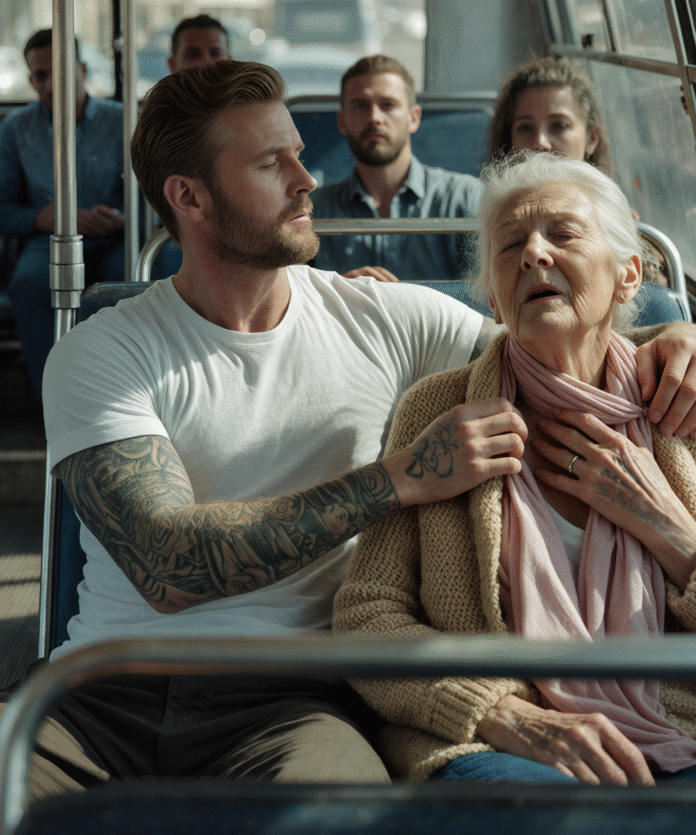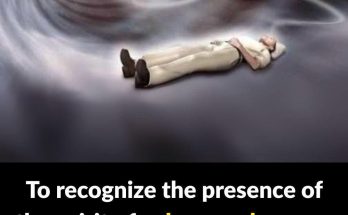The Glances That Wouldn’t Stop
The bus rattled down the crowded city street, its seats filled with tired workers, parents juggling children, and students heading home. At the back of the bus sat a young man in a white tank top, his headphones in, eyes closed as he swayed gently with the music. His arms were covered in colorful tattoos—ink that seemed to tell stories in lines and shades across his skin.
Not far away sat an elderly woman. Her silver hair was tucked neatly beneath a scarf, and her hands clutched a worn leather purse. She glanced at him, then quickly looked away. But within moments, her eyes flicked back, scanning the swirls and shapes on his arms. She muttered to herself, shaking her head as though each glance confirmed her worst fears about “today’s youth.”
The young man didn’t notice. His world was filled with rhythm and melody. But the whispers weren’t just in her own head anymore. A few other passengers caught her glances, some raising eyebrows, others smirking. It was clear tension was brewing.
Finally, the woman’s patience snapped.
The Confrontation
Her voice rang out louder than the engine of the bus.
“What has happened to the youth today?” she exclaimed. “Why do you mark your body with such dreadful drawings? It’s shameful!”
The young man blinked, pulled out one earbud, and turned toward her with calm curiosity.
“Ma’am, is something bothering you?” he asked politely.
“Bothering me?” she scoffed. “With a body like that, you’ll never enter heaven. It’s a terrible sin! How can this earth carry people who destroy themselves this way?”
The bus grew quiet. Heads turned. Some passengers shifted in their seats, eager to watch.
The young man’s expression stayed calm. “I haven’t done anything wrong to you. This is my body, and I have the right to choose what I want.”
But his words didn’t soothe her. They only stirred her anger further.
Heated Words
“In my time,” she shouted, “young people respected their elders! They didn’t talk back. Because of people like you, everything has gone downhill. You walk around decorated like demons! Your poor parents would be ashamed. With those drawings, you won’t ever find a decent wife. The Lord will punish you—you’ll wander this world until you realize your mistakes!”
Her voice cracked as she raised her trembling hands and crossed herself. “May your hands grow weak if you dare ruin your body again. May every new mark weigh heavy on your soul!”
The young man sighed. He didn’t lash back, didn’t argue further. He simply looked out the window as the city rolled past. His quiet demeanor only made her shake her head harder.
“My blood pressure is rising because of you, rude boy!” she muttered loudly enough for the whole bus to hear. “Thank heavens I never had children like you. The world today is lost!”
Some passengers exchanged glances, unsure whether to intervene or ignore it. Most chose silence. The bus rolled on.
Then, without warning, everything changed.
The Sudden Turn
The old woman’s hand flew to her chest. Her face went pale, lips trembling as she gasped for air.
“Oh… I don’t feel well… I can’t breathe,” she whispered, her voice cracking into panic.
Passengers stiffened but didn’t move. Some pretended not to see, others turned away nervously. The energy in the bus shifted from tense to fearful—but no one acted.
No one except the young man with tattoos.
He pulled off his headphones completely and leaned toward her. His voice, steady and calm, carried across the bus.
“Grandma,” he said gently, “I’m a paramedic.”
The words stunned everyone. It was as if the air itself paused. The boy she had just condemned was the only one who knew exactly what to do.
A Different Side of Him
He sprang into action. Moving with practiced precision, he slipped off her scarf, unbuttoned the top of her sweater to ease her breathing, and supported her so she could sit more comfortably.
“Steady breaths,” he instructed. “Stay calm. Don’t panic.”
The bus fell into silence as passengers watched, wide-eyed. His hands were confident, his voice soothing, nothing like the “rude boy” she had accused moments earlier.
He checked her pulse quickly, then pulled out his phone. “She’s having spasms—her blood pressure is unstable,” he reported to the dispatcher. His words were clear, professional, urgent but not panicked.
“We need an ambulance right away. Route 47, eastbound bus, near Maple and 3rd. Elderly woman, chest pains, unstable vitals.”
He hung up and stayed right by her side, holding her trembling hand in his ink-covered one. “Hold on, Grandma. The doctors are coming. You’ll be okay. I’m right here.”
Slowly, her breathing steadied. Her pale face softened with relief, though her eyes showed something more—surprise, embarrassment, even regret. She tried to form words but could only manage the faintest nod.
Reflections in the Silence
The bus rolled to a stop as the sirens wailed closer. Paramedics rushed aboard, immediately transferring her to a stretcher. But even as they worked, the woman’s eyes stayed on the young man.
The tattoos she had despised a moment before now seemed irrelevant. What mattered was the kindness in his voice, the strength in his hands, and the compassion that radiated from him.
As she was carried off, he quietly gathered his things, slipping his earbuds into his pocket. The other passengers—those who had stayed silent, those who had done nothing—watched with humbled eyes.
It wasn’t the young man who looked small in that moment. It was the rest of them.
The Lesson Left Behind
Later, passengers who had witnessed the scene whispered about it to friends and family. Some said the grandmother learned her lesson in humility that day. Others said the real message was for the rest of them—for those who stayed frozen in their seats while a young man she had insulted became the only one willing to act.
The truth was simple. Kindness doesn’t wear a uniform. Compassion doesn’t look a certain way. And sometimes, the very person you judge most harshly is the one who will save you when it matters most.
The old woman may never look at tattoos the same way again. And perhaps, just perhaps, some of the passengers on that bus walked away seeing the world differently too.
Because heroes don’t always look like heroes. Sometimes they wear headphones, ride the bus like everyone else, and carry their stories on their skin. And sometimes, those same hands are the ones that keep your heart beating when it threatens to stop.



